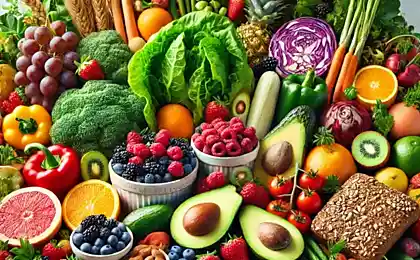660
Thirteen myths about nutrition that it's time to stop believing

Myth # 1 – the "Calories consumed, calories burned" is a vicious concept. Most importantly, what you eat, not how many calories it contains. Many people think that to lose weight enough to count calories.
Although you may think that all calories from all foods are the same, but your body reacts differently to what you put in. Researchers Richard Feinman and Eugene fine debunked the myth of "the consumed and burned calories" in his article published in the journal "Nutrition" ("Food") in 2004.
Myth # 2 – "whole grain Flour is a staple food" Flour based products wheat may not be beneficial to your health. And labels on packages of whole grains of wheat, such as "heart healthy" ("health for the heart"), perhaps too true. First, the researchers found that eating wheat can increase the number of factors that can lead to heart disease. Second, the nutritionists also discovered that many people throughout the world suffer from different degrees of Allergy (not previously classified by science) on wheat gluten. There is a wide range of gluten-induced disorders, and every day more and more people are diagnosed with "sensitivity to gluten".
Myth # 3 – "avoid coffee, avoid caffeine!" In 1999, "the European journal of clinical nutrition" stated that coffee may also raise blood pressure. It is also true and the claim that caffeine can contribute to dehydration. But in most cases it can be due to the fact that many people just substitute the water for coffee. In other words, coffee is not harmful to your health if you consume it in moderation. Check for yourself the facts about coffee that improve human health, and which you may not know:
- coffee may reduce the risk of developing diabetes of the 2nd type to 67 percent;
- it reduces the risk of liver disease;
- caffeine can increase cognitive function and mental performance of the person as a whole;
- caffeine increases the basal metabolic rate of substances in the body, improving metabolism.
Myth # 4 – "Eggs not good for you" In reality, eggs are one of the best foods you can eat! They are rich in protein, antioxidants, various vitamins and minerals, which are known as very beneficial to health. Eggs got a bad reputation because of the high level content of cholesterol. But you may not know that several recent studies have shown that eggs actually help to increase "good" cholesterol HDL (or otherwise HDL, high-density lipoprotein). Scientists who conducted research in 2006-m year, argued, debunking the myths about eggs that they recommend to most people to add them to your diet. Eggs also contain two important nutrients that have been proven can improve and restore vision is a lutein and zeaxanthin, which are not present in many other natural products.
Myth # 5 — "Saturated fats are bad for you" For some reason, it became widely known that it is necessary to avoid saturated fats because they increase levels of "bad" LDL cholesterol (called low-density lipoproteins LDL). It turns out that this is far from the truth and any evidence of this assertion is not. Researchers, in conjunction with the "American journal of clinical nutrition" reviewed the reviews twenty-one studies on saturated fats, and has determined that there is no correlation between cardiovascular diseases or stroke, and saturated fats. The truth is that in moderation saturated fats are not bad for you!
Myth # 6 – "to Eat meat is bad", more and more people are turning to vegetarian diet trying to stay healthy. For some reason, there is a misconception that red meat contains harmful substances that can lead to heart disease and cancer. Researchers who have studied case histories and nutritional habits, considering more than a million individual diets, found that eating unprocessed red meat does not lead to an increase in the incidence of diabetes or cardiovascular diseases.
Myth # 7 – "a Diet low in fat and high in carbohydrates useful" Diet, which "cut" the fat do not work as they expect. It is puzzling that people still use diets that require low fat intake. For seven years, studies of such diets, scientists have proved that the fat-free diet allows women to lose weight only one pound more than the diet group with normal fat content. If such a conclusion someone is not impressive enough, it is possible to "finish" a low-fat diet, if to note that it "cuts out" from the diet, some healthy fats that actually increase the number of "good" cholesterol HDL.
Myth # 8 – "the low-carb diet harmful" Many nutritionists raise the question of the effect of low-carb diets. Let's look at the facts that prove that low carb diets actually have a lot of significant advantages. And the most important is that the use of such diets in overweight people is one of the most effective methods for quick weight loss.
Research conducted in 2003, proved that low-carb diets do not increase the risk of developing diabetes of the 2nd type and cardiovascular disease. In addition, the researchers recommended in the "Journal of the American medical Association" a low-carb diet as one of the most effective ways to lose weight for the obese people. Nutritionists and scientists who support low-carb diets recognize the fact that there is no information about the impact of such diets on human metabolism in the long run, but nonetheless, they emphasize that a diet low in carbohydrates can help people to quickly return to a healthy weight.
Myth # 9 – "you Need to eat less salt" Sodium has a bad reputation among people who care about health, while in reality it is a vital electrolyte, "fuel" necessary for many physiological functions. Diets low in sodium can help people with high blood pressure, but everyone else should stick with normal level of sodium consumption. According to the researchers from the "American Diabetes Association" diets low in sodium can increase the risk factors of diabetes mellitus of the 2nd type.
Myth No. 10 – "If there are 5 or 6 times a day, that promotes weight loss" the First problem in this idea is that eating for six receptions on the day does not help weight reduction. Among the many studies on weight loss, one study reported in "International journal of the metabolic disorders associated with obesity", argues that no differences in the rate of metabolism between people who ate two times, four times or six times a day. Trying to eat more often during the day to accelerate your metabolism and to lose weight, you can just actually start eating more.
Myth # 11 – "you Need to eat fish to get omega-3 fatty acids" the Fact that fish contains omega-3 fatty acids, which are good for the heart is the truth. But it is also true that the water pollution contaminates the fish known environmental toxins that can cause a multitude of diseases and health problems. Thanks to a study conducted by researchers from Indiana University found that it is impossible even to avoid environmental toxins with fish farms. The fish grown on such farms, in fact contains far more toxins than wild fish. You can eat fish, but do not make it the only source of omega-3 fatty acids. Use other sources that also contain healthy fatty acids such as flax seed oil.
Myth # 12 – "the Fat is what makes you fat" If you don't eat fat then you become fat, right? Wrong. Consumed fat is not the cause of overweight. "British medical journal" has shown that sugar and carbohydrate diets are the culprits of obesity. According to the magazine, studies conducted in 1950-ies have proven that a diet high in fat can actually lead to weight loss in the absence of carbohydrates.
Myth # 13 – "There is a lot of protein is bad" Proteins actually have a much healthy, and unless you have kidney disease, you should eat more of them. First of all, protein stimulates the metabolism. In studies diets conducted in 2012 it was established that the calories derived from protein, to increase energy expenditure during rest and reduce the likelihood of retaining this energy in the form of fat. If your goals in practicing fitnessmanswers increase metabolism or muscle, you need protein. Protein also helps to increase bone density in older people, reduces the chances of getting diabetes and helps to preserve muscle mass when losing weight.
Source: monoblog.su/























